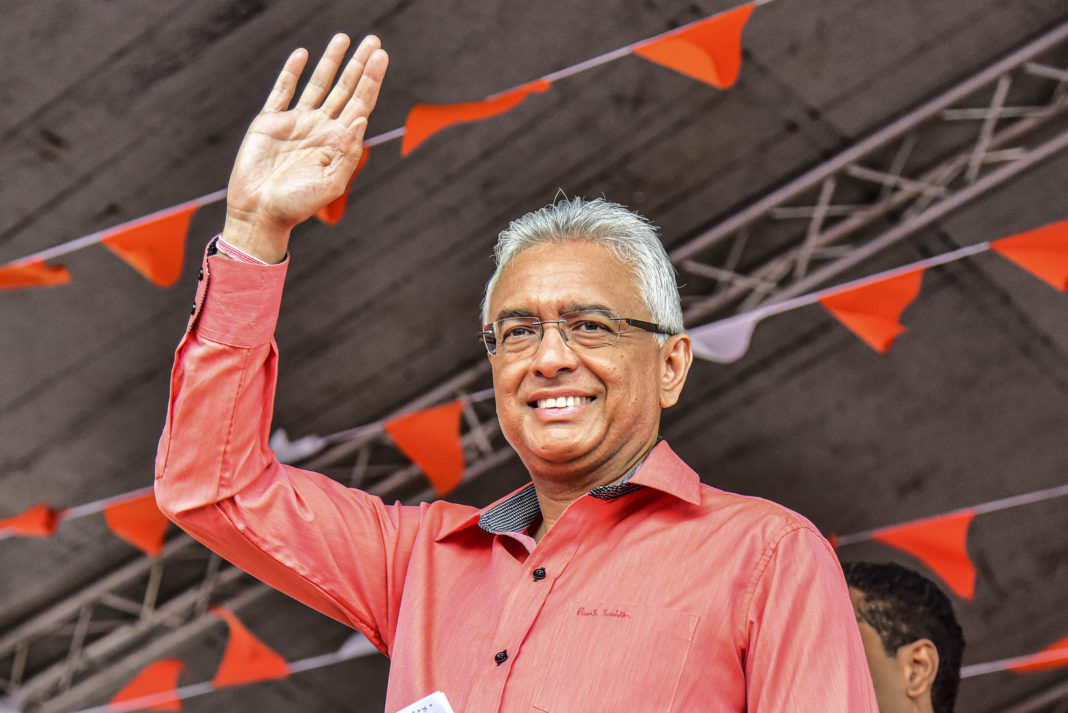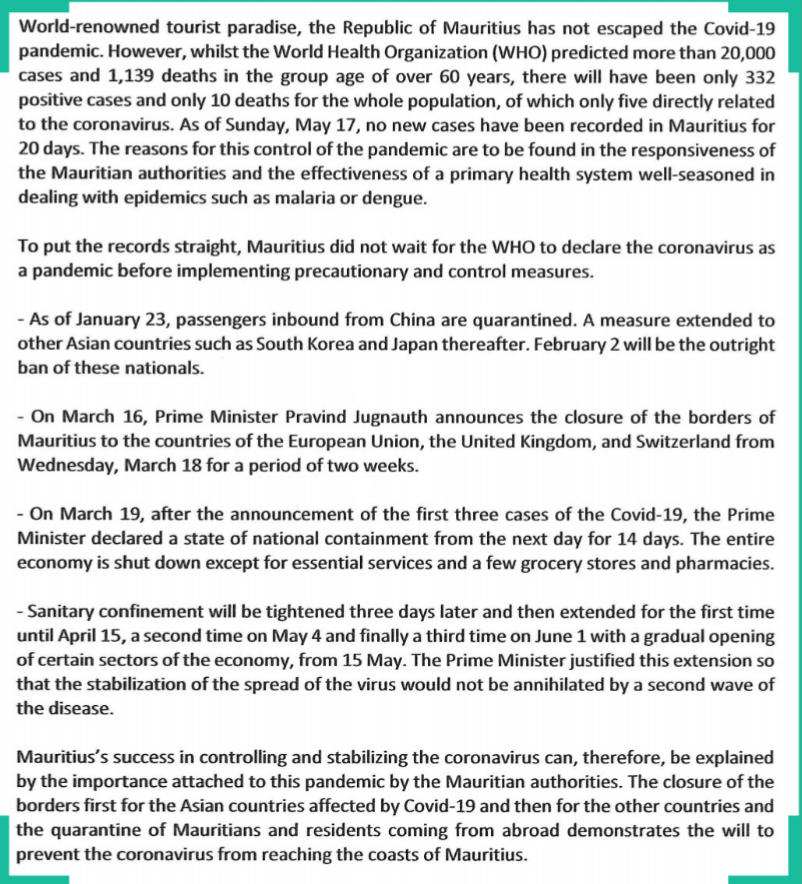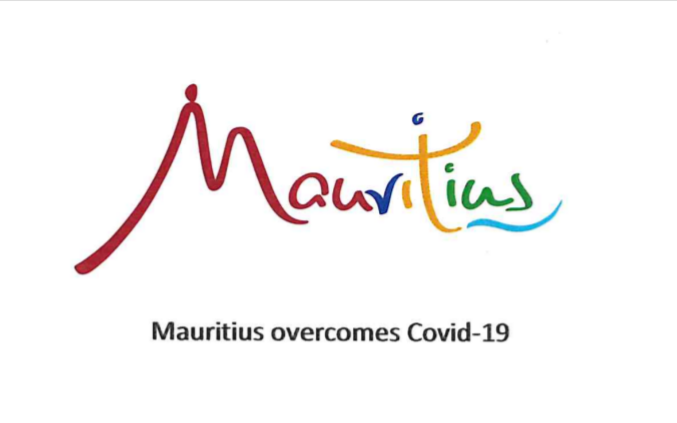
Mauritius’s Prime Minister Pravind Jugnauth -File Photo GPN

- Mauritius’s Prime Minister Pravind Jugnauth reacted immediately after three people were infected with Covid-19. Testing people for the virus was a priority and going to the beach was banned.
MUMBAI, 22 MAY, 2020 (GPN): MTPA revealed that from January 23, passengers inbound from China were quarantined, a measure extended to other Asian countries such as South Korea and Japan shortly thereafter.
The destination declared a travel ban for these countries from February 2. Prime Minister Pravind Jugnauth announced the closure of the borders of Mauritius to the countries of the European Union, the United Kingdom by March 16, and Switzerland from Wednesday, March 18, for an initial period of two weeks.
By March 19, following the announcement that the country faced it’s first three cases of the Covid-19 virus, the prime minister declared a state of national containment for 14 days. The entire economy shut down, except for essential services and a few grocery stores and pharmacies.
Sanitary confinement was tightened three days later. It was extended three times, and a gradual opening of certain sectors of the economy commenced from 15 May.
“Mauritius’s success in controlling and stabilising the coronavirus can, therefore, be explained by the importance attached to this pandemic by the Mauritian authorities. The closure of the borders first for the Asian countries affected by Covid-19 and then for all other countries, and the quarantine of Mauritians and residents coming from abroad, demonstrates the will to prevent the coronavirus from reaching the coasts of Mauritius,” the statement by MTPA revealed.
By March 19, following the announcement that the country faced it’s first three cases of the Covid-19 virus, the prime minister declared a state of national containment for 14 days. The entire economy shut down, except for essential services and a few grocery stores and pharmacies.
“We also note a desire for transparency and continuous communication with daily press conferences of the Mauritius National Communication Committee of Covid-19 and regular interventions by the Prime Minister even when he was in self-isolation. An application, beSafeMoris, was also launched for continuous and updated information on the situation and the necessary precautions to be taken, ” the statement added.
Mauritius believes the experience of local health services for diseases such as malaria has greatly helped in monitoring contact tracing of people found to be positive.
MTPA also stated that the centralisation and creation of isolation units for people in need of intensive care has minimised the spread of the virus. Mauritius also created quarantine centres to accommodate all locals back to the country.
Rodrigues Island, another part of the Mauritian Republic, located 600km from Port-Louis, recorded no cases of the virus. The sanitary confinement there lasted only 14 days.
MTPA revealed that tests for the Covid-19 virus will continue for everyone who worked during the confinement period, including medical personnel, police and other essential staff. To date, 87 177 tests of Covid-19 have been performed and 149 people are still in quarantine.
Globally, one of the hardest-hit sectors has been the travel and tourism industry and Mauritius is no exception. The tourism industry is an important component of the Mauritian economy, which, in its most narrow definition, accounts for 8.6 per cent of GDP and ten per cent of total employment. Even more importantly, however, as an AfrAsia Bank Senior Executive has pointed out, ‘The tourism sector, if you take into consideration the hotel industry, as well as all the ancillary businesses that make up the tourism industry, accounts for approximately 25% of GDP.’ The impact of COVID-19 will be significant.
The United Nations World Tourism Organisation estimates that, in 2020, international travel could fall by between 60 and 80 per cent, which would, on the global scale, translate into:
Between 850 million and 1.1 billion fewer international tourists
The loss of US$910 billion to US$1.2 trillion in export revenues from tourism Between 100- to 120-million direct tourism jobs placed at risk
Prior to the pandemic, the Mauritian Government’s targets of 1.6 million tourist arrivals in 2020 and two million in 2030 may have looked achievable, and even laudable. After COVID-19, those are targets that will clearly need to be revised.
Complicating matters is the fact that, even after international travel is able to safely resume, with flag carrier Air Mauritius having been in voluntary administration since late-April and South African Airways (SAA) teetering on the brink of liquidation, getting travellers to Mauritius may not be as easy as it used to be, either. Those airlines are two of the main carriers bringing arrivals to Mauritius and, if they fold, their absence will be felt. A ray of hope may come from Ethiopian Airways, which, although grappling with the effects on travel of COVID-19, continues to be a rare aviation success story. Ethiopian is reportedly in discussions over the acquisition of a stake in Air Mauritius and has also indicated that it is willing to enter into similar talks with the South African authorities over the future of SAA.
Affected alongside the tourism industry have been textile exports and the construction industry, as the demand from wealthy foreigners looking to purchase luxury properties in Mauritius has also dried up. The greatly reduced inflows of foreign cash from those sectors will affect living standards, both directly via pay packets and less directly by reducing the value of the local currency, which has already fallen against the US dollar and the euro.
Another cloud on the economic horizon is the possible blacklisting of Mauritius by the European Union from 1 October, after having placed low-taxing Mauritius on its list of high-risk countries for money laundering and the financing of terrorist networks. Given the importance to the economy of the financial services sector, the Mauritian authorities may take their time in weighing up the costs and benefits of complying with the EU, although it is hard not to see eventual compliance.
The financial services sector is helping to prop up the ledger, along with the foreign reserves of approximately US$7.2 billion held by the Mauritian Government and earnings from the export of sugar products, demand for which has not fallen away. Until the development of the tourism industry in the 1970s, the sugar industry was the largest economic activity in Mauritius and the only real source of foreign exchange earnings. For now, the sugar-based agricultural sector, although only employing eight per cent of the workforce, is enjoying a renewed importance. ENDS


Be the first to comment on "Mauritius overcomes Covid-19: MTPA"